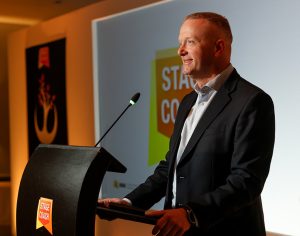Human resources (HR) can have the best managers pulling their hair out. It’s a constantly evolving space with new regulations, which aim to improve practices and promote good relations between staff and employers, being introduced by parliamentarians on a regular basis. For franchisors and franchisees, HR has some unique challenges. On the one hand “franchisors have to ensure compliance not only in their own businesses but also in their franchisees’. Furthermore, franchises are known for their consistency irrespective of location. This relies upon the performance of staff and their hiring of the right personnel throughout the network. One bad apple in a franchise can impact upon everyone else, so those at the top have an added responsibility to get things right.
Responsibility
Typically franchisors will pass on the liability for employing staff to their franchisees as few would be prepared to take on the risk of someone else’s hiring decisions. However, this does not mean that franchisors should not be closely involved with HR decisions taken by their franchisees. For instance, it is not uncommon for franchise businesses to centrally manage HR through shared software systems.”
Furthermore, employee contracts can be standardised across the network. Michelle Fenwick is a director of Heritage Healthcare Franchising, which provides carers for elderly and vulnerable people so they can be looked after in their own homes. As the employees of franchisees are entering clients’ homes the business has an additional responsibility to ensure that all staff are fully vetted and suitable for the role. “The franchisees have to put all the documentation for staff through our software, which doesn’t accept them on to the system unless all the fields are complete,” Fenwick explains. “All staff need to have experience, at least two references and we carry out criminal record checks. No-one can work for us without them being on our system.”
Fenwick also spends time with her franchisees and makes regular visits to ensure that the business is being conducted in the correct way. “I visit them all on a monthly basis and carry out an audit of the business. I also speak to staff – not just the franchisee.” “
Training
Franchisees are often experienced and mature professionals but franchisors still need to make sure they are well-trained when it comes to hiring staff. Fenwick says she trains all franchisees on issues a wide range of HR issues and that this is a major part of the course. “”HR forms a large part of our training programme. Franchisees are taught how to advertise, how to interview and what qualities to look for,” she says. “We always support franchisees with staff issues and provide advice and support.”
Pay
If there’s one employee issue that needs careful consideration it is pay. Pay too little and you won’t get the best staff, too much and the business may end up less competitive. Franchisors will have spent time getting these issues resolved before rolling out their business models to others and so will tend to be involved in the creation of a payment structure. Some franchises will have uniformity throughout the network, but this becomes tested the bigger the franchise becomes and especially if it has overseas operations.”
Sophie Atkinson is the managing director of £40m vehicle cleaning product business Autosmart which has franchises across the UK, Ireland, France, Holland, Germany, Sweden and Australia. Due to operating in many territories, it has to allow for some flexibility on pay and contracts but still retains some control. “Our franchisees tailor their pay to their local market conditions but we have uniformity within each country,” says Atkinson. “Within that country we have policies that make sure that pay is fair across different staff members according to their job roles. For example our UK regional franchisee managers all have the same pay benchmark; so do the UK franchisee recruiters. But the pay of the recruiters and the franchisee managers is different.”
Disputes
All employers dislike internal disputes and the prospect of a staff tribunal is one of their biggest fears. However, for owners of rapidly growing businesses they tend to be a part of doing business; the more staff a company employs the greater the chances of something going awry. All businesses be they franchisors, franchisees or not, should have systems in place which limit the impact of such problems. Good HR is precisely that and it means when something goes wrong there’s a method to deal with it. Franchisees will typically be liable for their own staff issues although this doesn’t mean that head office can’t be involved. “The franchisees are liable for tribunals for staff they employ, we are liable for staff that we employ,” says Atkinson. “As managing director, appeals would come to me. I have chaired four in my 15 years at Autosmart.””
Lost in translation
Sophie Atkinson is the managing director of Autosmart which has franchises in six different countries. She says employment law varies hugely from country to country but that France is still “puzzling”
“Each country is entirely different, and we have local HR advisors in each country that we employ staff in. At the start we had thought it sensible that our policies mirrored the UK. We quickly realised that this was the wrong approach and that what worked best was to have the same philosophy interpreted locally,” says Atkinson.”
“Where Germany is very similar to the UK, we have found, and still find, France puzzling. Employees have enormous rights compared to any other country we have employed staff in,” she says. “There are many other differences too. Bank holidays are numerous but vary by year because the dates float about, and in some years fall on weekends. There has to be a three week block of holiday taken in the summer or you are in trouble. Our sales staff work shorter hours than in any other country – they are prohibited to do more by law.”
“Luncheon vouchers are a very typical component of pay. Bonuses are not common. Maternity is very different, it is typical to see an expectant mother signed off on sick leave in her last trimester, yet it is also typical to see the new mum back at work when her child is 12 weeks old. France has fantastic state-funded childcare provisions. We find our French staff very loyal, there seems to be a culture of find the right company for you and then stay.””

Jon Card
A writer and journalist specialising in small business and enterprise, Card works as a freelancer for The Guardian and was previously editor of Birmingham Living magazine. He is a proud father of a gorgeous little boy and a big fan of the USA.

Jon Card
A writer and journalist specialising in small business and enterprise, Card works as a freelancer for The Guardian and was previously editor of Birmingham Living magazine. He is a proud father of a gorgeous little boy and a big fan of the USA.
































